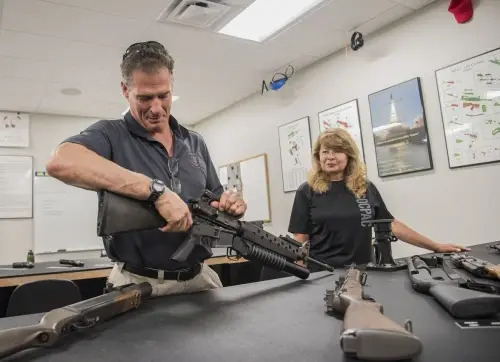U.S. AMBASSADOR TO NEW ZEALAND SERVES AS NAVSCIATTS GRADUATION KEYNOTE SPEAKER
By MyBaseGuide Staff Member

Story by Angela Fry on 09/24/2019STENNIS SPACE CENTER, Miss. The Honorable Scott Brown, United States ambassador to New Zealand and the Independent State of Samoa, served as the keynote speaker for the Naval Small Craft Instruction and Technical Training School's (NAVSCIATTS) 19-5 semester graduation events, Sept. 18 and 19.
The semester, which primarily focused on the U.S. Indo-Pacific Command's (USINDOPACOM) areas of operation, featured the international training command's flagship course, the Strategic Leaders International Course (SLIC), which was comprised of 21 senior level officers from Bangladesh, Cameroon, Indonesia, Jordan, Lebanon, Malaysia, Saudi Arabia, and Thailand. The main body graduation featured 90 students from the USINDOPACOM and U.S. Southern Command regions, who participated in nine courses of instruction that covered tactical, strategic, and operational proficiencies.
In remarks to the strategic level graduates, the former U.S. senator to Massachusetts described his decision to enlist into the National Guard and how that decision provided the opportunity to help his community and forge relationships, much like the opportunity partner nation strategic leaders receive while attending NAVSCIATTS.
"You are the new leaders of your country," expressed Brown, who retired at the rank of colonel after serving as the deputy to the chief counsel to the chief of the National Guard Bureau at the Pentagon. "You have fiduciary and real responsibilities to be those leaders and to be good leaders to all the men and women in your countries who need you. We are at a pivotal time in our world's history where there is a tremendous amount of greatness. But there are also some troubling aspects."
Prior to graduation events, the ambassador and his wife, Gail, and Capt. Supachia Tanasansakorn, deputy commander of the Royal Thai Navy Naval Special Warfare Command, received the final strategy brief from the SLIC students, the culminating event of their month-long course. The 19-5 SLIC final strategy brief depicted the use of the Majlis al Shura strategy of utilizing Islamic leadership to counter violent extremism and manage great powers within Southeast Asia. The strategy is a means for promoting social cohesion and facilitates the management of regional major powers.
Brown explained that serving as ambassador to one of the world's largest geographic areas, he addresses many of the same challenges that the countries represented in the semester face. Some of those shared challenges include climate change, human and drug trafficking and illegal fishing. "We are trying to make sure that we can protect a free and open Indo-Pacific and making sure that you are not going to have to pay a toll from Indonesia to Singapore to do you trading as you go through certain areas."
In remarks to the NAVSCIATTS' command team of Cmdr. Eric Skalski and Master Chief Petty Officer Ben Hartwell, and others in attendance, Brown took the opportunity to address other shared challenges within the region. "I know that each and every one of you have had experiences with China and you will hear it from me right now. They are not the enemy," he stressed regarding the National Defense Strategy priority pertaining to Great Power Competition.
"We respect what they are doing and we respect their ability to do it," he explained. "We just want to make sure they play by the rules. Respectfully, you can't manipulate the currency. You can't steal our intellectual property. You can't do forced corporate sales. You can't manipulate your internet and shut it down whenever you want to. You can't build and militarize islands and change the law of the air and the sea, international law that has been in effect for hundreds of years, just because you are big and strong. You can't use the World Trade Organization and claim you are a developing nation when you have nuclear weapons, a massive second largest military in the world and you are giving away billions of dollars in the One Belt, One Road program," he continued.
Brown explained that addressing this challenge should be from the perspective of diplomacy and further establishing relationships within the area. "We have an opportunity and an affirmative obligation together to make sure that we welcome China into the fold and say Please trade with us. Please come and help us and please let us come and help you.' Look, you have to play by the rules and they are not. My job as an ambassador is to make sure that they do and we are having great success. I commend New Zealand and Australia and every one of you in the ASEAN (Association of the Southeast Asian Nations) region who are doing your very best to push back to make sure that we can have a respectful relationship without bigger countries taking over."
Capt. Supachia Tanasansakorn, who will be named commander of the Thai Naval Special Warfare Command in October, further hammered home the point of establishing a global network of partners. "Looking at the world around us now-a-days, you can see a lot of complex problems that cannot be completely solved by only one unit, such as people smuggling, drug and human trafficking, international crime and major disasters," the Thai navy SEAL explained.
"I gained experience in the now famous Chaing Rai rescue operation in Thailand last year, when the local football team and their coach became stranded in the rapidly flooding cave system. We worked with specialists from the USA, UK and other parts of Europe, China, and Australia, amongst other countries, in difficult circumstances to free the team before tragedy struck. They are all alive with a happy ending. Like the phrase if you want to go fast, go alone, but if you want to go far, go together,' these relationships will make you go far."
NAVSCIATTS operates under United States Special Operations Command and Naval Special Warfare in support of Foreign Security Assistance and geographic combatant commanders' theater Security Cooperation priorities. The facility trains and educates partner nation special operations forces, SOF-like foreign security forces and SOF enablers across the tactical, operational, and strategic spectrums through in-resident and mobile training team courses of instruction.
NAVSCIATTS currently offers 20 courses of instruction, including its Partner Nation Instructor Program. Since 1963, more than 12,000 students from 121 partner nations have trained with NAVSCIATTS. For more news from Naval Small Craft Instruction and Technical Training School, visit https://www.socom.mil/navsoc/NAVSCIATTS/.
-30-
SHARE:
TAGS:
JOIN OUR NEWSLETTER
Get the latest news and military discounts



